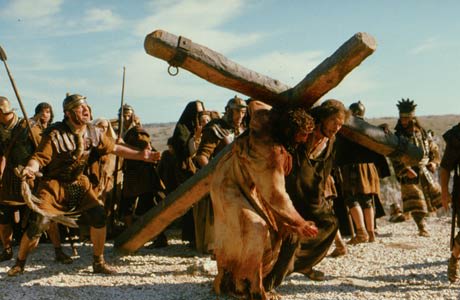The final steps taken by Jesus of Nazareth approximately 1971 years ago are amongst the most written about and filmed in the history of culture so much so that it is really only the cultural interpretations themselves that have informed most of our opinions about it. Chances are much greater that one has seen Martin Scorcese's The Last Temptation of Christ, for example, than has actually read much of the New Testament. To this cultural industry, devout Catholic Mel Gibson adds his interpretation of the final 12 hours of Jesus (Jim Caviezel) with The Passion of the Christ. (The title is taken from the Latin for suffering but also means a profound and transcendent love.) And while Scorcese's film was concerned with the duality of Christ's life as man and as God, Gibson's effort attempts to make wrenchingly visceral the suffering and sacrifice he endured. As an agnostic, I'd rather leave the religious debates to those better qualified and there will surely be plenty of debate from religious scholars of all stripes but Gibson does seem particularly interested in blame and responsibility, which lends credence to early claims that Jews were being particularly targeted by the film. Blame, according to this telling, falls on Judas Iscariot, certainly, and on the Jewish mob that pushes the Romans towards a death sentence, but curiously, Gibson makes a point of absolving the Romans of their responsibility Pontius Pilate (Hristo Naumov Shopov) literally washes his hands of the affair. But more than blame, Gibson uses all his ample skills as a director to flay his audience with brutal images of torture and suffering, particularly in the "scourging" scene. (Christ is whipped as punishment before the mob insists upon his crucifixion.) It's a scene that in any other context would be vilified as the worst excess of violent filmed entertainment; it's so stomach-wrenching that to continue watching takes some serious commitment. For the last hour, Caviezel as Christ, more blood and raw flesh than skin, drags himself to his fate. Its place as religious propaganda has yet to be decided, but as filmmaking, Gibson shows that his Oscar for Braveheart was no fluke here is a man in full control of his artistic vision, and the end result is potent even without the weight of religious significance behind it. That the last hour seems to take Christ's final walk in real time dulls its narrative momentum a little, but Gibson's imagery captured by cinematographer Caleb Deschanel (The Right Stuff) does right by the baroque art of Caravaggio that inspired him. Gibson will have little control over this film's aftermath, but he should be proud that he achieved what he set out to do: this is a singular work of art, one man's vision brought to the screen. (Icon/Equinoxe)
The Passion of the Christ
Mel Gibson

BY James KeastPublished Jan 1, 2006